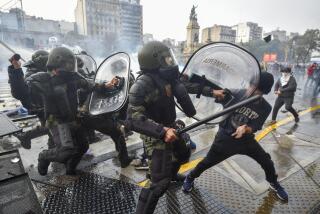Argentine General Strike, Protests Over IMF Role Challenge Alfonsin
- Share via
BUENOS AIRES — Labor unions demanding higher pay and a break with the International Monetary Fund went on strike across Argentina on Thursday, and tens of thousands of protesters massed before government house in an angry challenge to the beleaguered government of President Raul Alfonsin.
The general strike and demonstration, sponsored by the Peronist-led General Confederation of Labor, accentuated the grave political and economic crisis confronting Alfonsin’s 17-month-old government.
Amid inflation, recession and a lack of public confidence in either Alfonsin’s economic policies or the nation’s financial system, Argentine negotiators are in Washington this week to seek a new accord with the IMF for bailout loans.
Hostility to the IMF was the common denominator among the union protesters, who were joined by demonstrators from leftist and Marxist political parties. “The IMF or the People,” read one banner. “No to the IMF,” another proclaimed.
Austerity Resisted
The center-left Alfonsin, who took office in December, 1983, after nearly eight years of military rule, insists that a young democracy must demonstrate economic dividends to the people if it is to take root. Therefore, he has resisted traditional austerity measures of the sort exacted by the IMF in exchange for fresh funds.
Demonstrators Thursday demanded major wage increases, but the government has already ordered larger pay raises than orthodox economists would recommend.
The Argentine team in Washington is seeking IMF approval of policies ranging from a freeze on government hiring to overhaul of money-losing state enterprises. In return, it hopes for approval of a $1.4 billion standby loan agreement.
The banks that hold most of Argentina’s $48 billion foreign debt are waiting for an IMF agreement before releasing a $4.2 billion loan that would enable Argentina to repay overdue debt interest. Financial sources say that the new money must be in place by June 10 if Argentina is to avoid being declared a substandard borrower, thereby lessening chances of future help.
Crowd Estimates
Police estimated Thursday’s chanting crowd in historic Plaza de Mayo at 65,000, while estimates by Argentine news agencies ranged as high as 200,000. Thousands of government workers risked sanctions to join the protesters, who were largely young, male and working class.
News agencies reported that the one-day strike, which began at 11 a.m., was largely successful nationwide. In some neighborhoods of the capital, however, commerce and transportation was near normal. In central Buenos Aires, police cordoned off a 100-square block area, and most shops and offices closed early, either supporting the strike or fearing its consequences.
Police made no attempt to interfere with the protest, but reinforced their foot patrols with heavily armed mounted riot police. No major incidents were reported.
Addressing cheering protesters before the presidential office building, the Casa Rosada, labor leader Saul Ubaldini charged that the government had lost touch with the workers.
‘They Should Go’
“The people cannot eat, live or care for itself with promises,” Ubaldini said. “If the government can’t solve the economic crisis, it should go.” The crowd screamed back, “They should go.”
Ubaldini said that Argentina’s unions, which are closely allied to the opposition Peronist Party, guarantee continued democratic rule.
“There will be no coup,” Ubaldini said, “not because the government doesn’t want one, but because we, the workers, are the only ones who will stop it.”
Thursday’s strike and demonstration signaled Alfonsin’s failure to successfully tread a path between restive Argentine workers and the foreign banks and IMF.
Last week, Ubaldini, a moderate in the Peronist context, challenged Alfonsin to remedy the economic crisis or abandon power. In response, Alfonsin publicly branded Ubaldini and his fellow labor leaders “whining wimps.” On Wednesday, the president told reporters, “We have two roads ahead for solving our social and economic problems: nostalgic whimpering, or work.”
Eroded Credibility
Alfonsin’s credibility and popularity have been eroded by his government’s failure to check inflation, now running at nearly 1,000% on a yearly basis, or to revive the stagnant economy.
One recent major victim of the worsening crisis was Banco de Italia y Rio de la Plata, the country’s 11th-largest bank, which failed May 10, costing thousands of depositors about $80 million in uninsured dollar deposits and about $50 million in partially insured peso deposits. The 113-year-old bank was the eighth to fail since the government raised reserve requirements last month.
On May 17, the government froze all dollar accounts for 120 days, affecting between $700 million and $1 billion in private deposits. Wednesday, there was a run on safety deposit boxes amid rumors--promptly denied--that the Central Bank would seal them on behalf of tax investigators.
More to Read
Sign up for Essential California
The most important California stories and recommendations in your inbox every morning.
You may occasionally receive promotional content from the Los Angeles Times.










